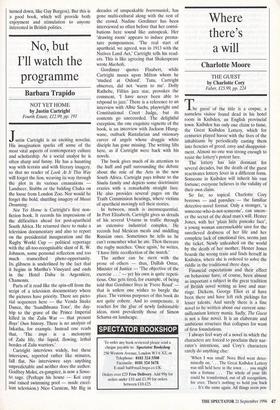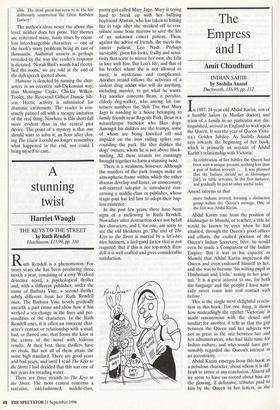Where there's a will
Charlotte Moore THE GUEST by Charlotte Cory Faber, £15.99, pp. 224 The guest' of the title is a corpse, a nameless visitor found dead in his hotel room in Knibden, an English provincial town. Knibden has only one claim to fame, the Great Knibden Lottery, which for centuries played havoc with the lives of the inhabitants by periodically casting them into frenzies of greed, envy and disappoint- ment. Almost no one was strong enough to resist the lottery's potent lure.
The lottery has lain dormant for several decades, but the death of the guest reactivates lottery fever in a different form. Someone in Knibden will inherit his vast fortune; everyone believes in the validity of their own claim.
So far, so topical. Charlotte Cory borrows — and parodies — the familiar detective-novel format. Only a stranger, 'a someone-who-is-not-someone', can uncov- er the secret of the dead man's will. Hester Jones, with her 'plain little pancake face', a young woman unremarkable save for the unrelieved drabness of her life and her complete lack of emotional ties, seems just the ticket. Newly unleashed on the world by the death of her mother, Hester Jones boards the wrong train and finds herself in Knibden, where she is ordered to solve the riddle in the traditional three days.
Financial expectations and their effect on behaviour have, of course, been almost as important a subject in the great tradition of British novel writing as love and mar- riage. Dickens, George Eliot et al have been there and have left rich pickings for lesser talents. And surely there is a fine novel to be written about our current ante- millennium lottery mania. Sadly, The Guest is not a fine novel. It is an elaborate and ambitious structure that collapses for want of firm foundations.
I always feel wary of a novel in which the characters are forced to proclaim their nar- rator's intentions, and Cory's characters rarely do anything else:
`When I was small' Nora Bird went deter- minedly on, `. .. The Great Knibden Lottery was still held here in the town .. , you might win a fortune ... The whole of your life could be transformed, out of all recognition, for ever. There's nothing to hold you back ... It's the same again. All things seem pos- sible. The dead guest has seen to it. He has deliberately resurrected the Great Knibden Lottery.'
The author's ideas never rise above this level; neither does her prose. Her themes are reiterated many, many times by count- less interchangeable characters — one of the book's many problems being its cast of thousands. Authorial anxiety is perhaps revealed by the way the reader's response is dictated. 'Norah Bird's words had electri- fied the room,' we are told at the end of the dull speech quoted above.
Humour is denoted by naming the char- acters in an eccentric sub-Dickensian way; thus Montague Cayke, Chickie Wilkes- Tooley, the Reverend Gilbert Duncie Sib- son. Hectic activity is substituted for dramatic excitement. The reader is con- stantly palmed off with a meagre imitation of the real thing. Nowhere is this short-fall more evident than in the central plot device. The point of a mystery is that one should want to solve it; an hour after clos- ing The Guest I could no longer remember what happened in the end, nor could I bring myself to care.



















































































 Previous page
Previous page